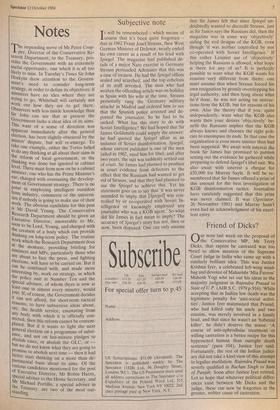Notes
The impending move of Mr Peter Crop- per, Director of the Conservative Re- search Department, to the Treasury, pro- vides the Government with an extremely useful opportunity, one which it is all too likely to miss. In Tuesday's Times Sir John Hoskyns drew attention to the Govern- ment's need to consider long-term strategy, in order to define its objectives: if ministers have no idea where they are trying to go, Whitehall will certainly not work out how they are to get there. Observers with less inside knowledge than Sir John can see that at presentthe Government lacks a clear idea of its aims. This want of a sense of direction was apparent immediately after the general election, has been slightly obscured by the miners' dispute, but will re-emerge.To take one example, either the Tories failed to do any thinking at all about their aims in the reform of local government, or the thinking was done but ignored at cabinet level. There must from now on be a cabinet minister, one who has the Prime Minister's ear, charged with overseeing the develop- ment of Government strategy. There is no Point in employing intelligent outsiders from industry, commerce or the universi- ties if nobody is going to make use of their ork. The obvious candidate for this post is Mr David Young. The Conservative Research Department should be given an Executive Director, answerable to Mr, soon to be Lord, Young, and charged with the creation of a body which can provide thinking on long-term policy. The routine Work which the Research Department does at the moment, providing briefing for ministers and MPs, particularly those who are about to face the press, and fighting elections, will have to be carried on. But it c an be combined with, and made more interesting by, work on strategy, in which the policy unit at Number Ten and the Special advisers, of whom there is now at lea.st one in almost every minstry, would ,)oin. If, of course, the Government decides it can not afford, for short-term tactical reasons, to have subversive ideas about, say, the health service, emanating from any body with which it is officially con- nected, then this reform cannot be contem- plated. But if it wants to fight the next general election on a programme of subst- ance, and not on last-minute pledges to abolish rates, or abolish the GLC, or — but we do not know what they are going to promise to abolish next time — then it had better start thinking on a more than de- partmental basis hbout its aims. Of the various candidates mentioned for the post of Executive Director, Mr Robin Harris, Special adviser to the Home Secretary, and Mr Michael Portillo, a special adviser in he Treasury, are two of the most out- standing.






















































 Previous page
Previous page